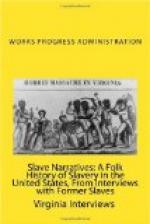I always worked in the fields with the men except when I was called to the house to do work there. ‘Masse’ Jenkins was good and kind to all us slaves and we had good times in the evening after work. We got in groups in front of the cabins and sang and danced to the music of banjoes until the overseer would come along and make us go to bed. No, I don’t remember what the songs were, nothing in particular, I guess, just some we made up and we would sing a line or two over and over again.
We were not allowed to work on Sunday but we could go to church if we wanted to. There wasn’t any colored church but we could go to the white folks church if we went with our overseer. His name was Charlie Bull and he was good to all of us.
Yes, they had to whip a slave sometimes, but only the bad ones, and they deserved it. No, there wasn’t any jail on the plantation.
We all had to get up at sunup and work till sundown and we always had good food and plenty of it; you see they had to feed us well so we would be strong. I got better food when I was a slave than I have ever had since.
Our beds were home made, they made them out of poplar wood and gave us straw ticks to sleep on. I got two calico dresses a year and these were my Sunday dresses and I was only allowed to wear them on week days after they were almost worn out. Our shoes were made right on the plantation.
When any slaves got sick, Mr. Bull, the overseer, got a regular doctor and when a slave died we kept right on working until it was time for the funeral, then we were called in but had to go right back to work as soon as it was over. Coffins were made by the slaves out of poplar lumber.
We didn’t play many games, the only ones I can remember are ‘ball’ and ‘marbles’. No, they would not let us play ‘cards’.
One day I was sent out to clean the hen house and to burn the straw. I cleaned the hen house, pushed the straw up on a pile and set fire to it and burned the hen house down and I sure thought I was going to get whipped, but I didn’t, for I had a good ‘masse’.
We always got along fine with the children of the slave owners but none of the colored people would have anything to do with the ’poor white trash’ who were too poor to own slaves and had to do their own work.
There was never any uprisings on our plantations and I never heard about any around where I lived. We were all happy and contented and had good times.
Yes, I can remember when we were set free. Mr. Bull told us and we cut long poles and fastened balls of cotton on the ends and set fire to them. Then, we run around with them burning, a-singin’ and a-dancin’. No, we did not try to run away and never left the plantation until Mr. Bull said we could go.
After the war, I worked for Mr. Bull for about a year on the old plantation and was treated like one of the family. After that I worked for my brother on a little farm near the old home place. He was buying his farm from his master, Mr. Tom Daley.




